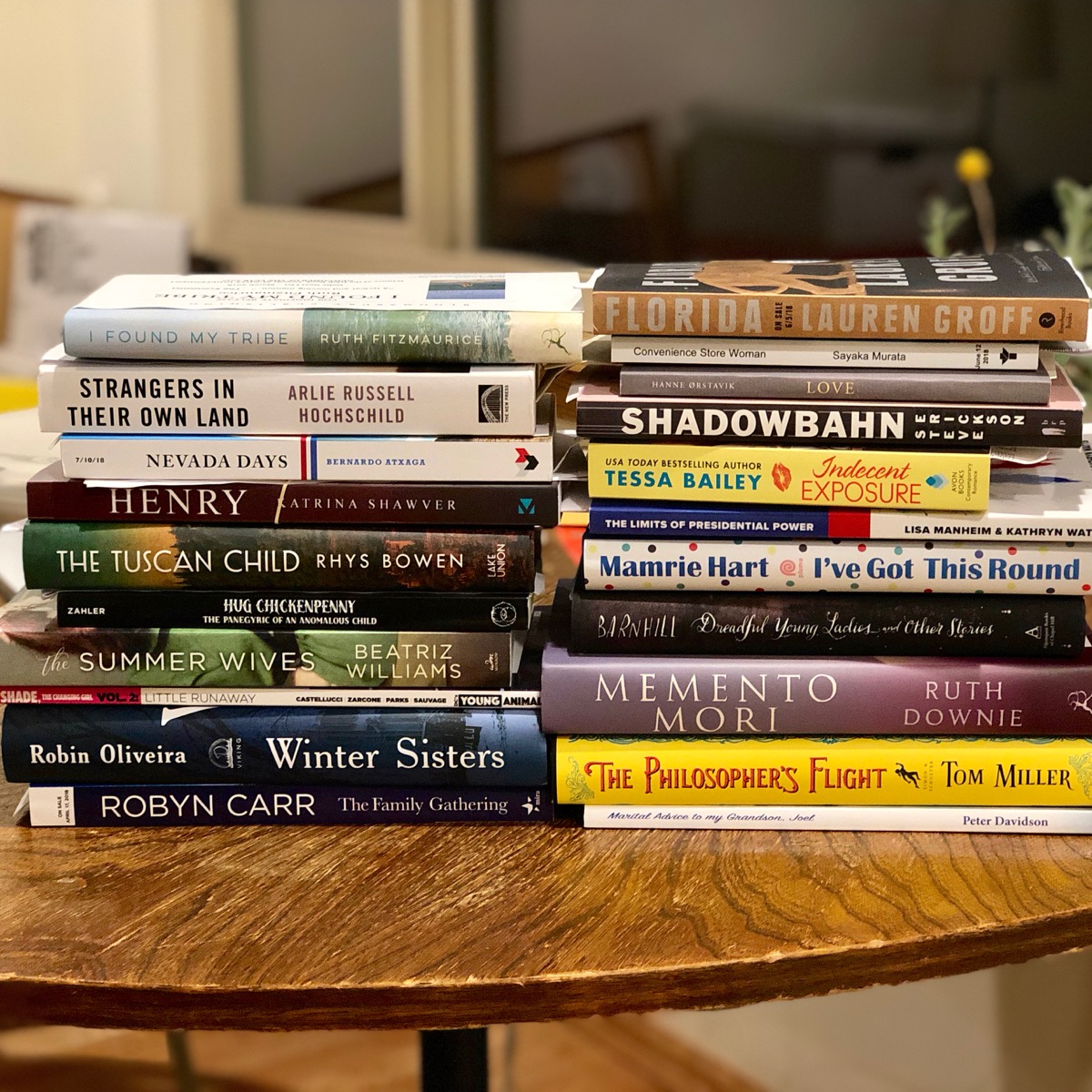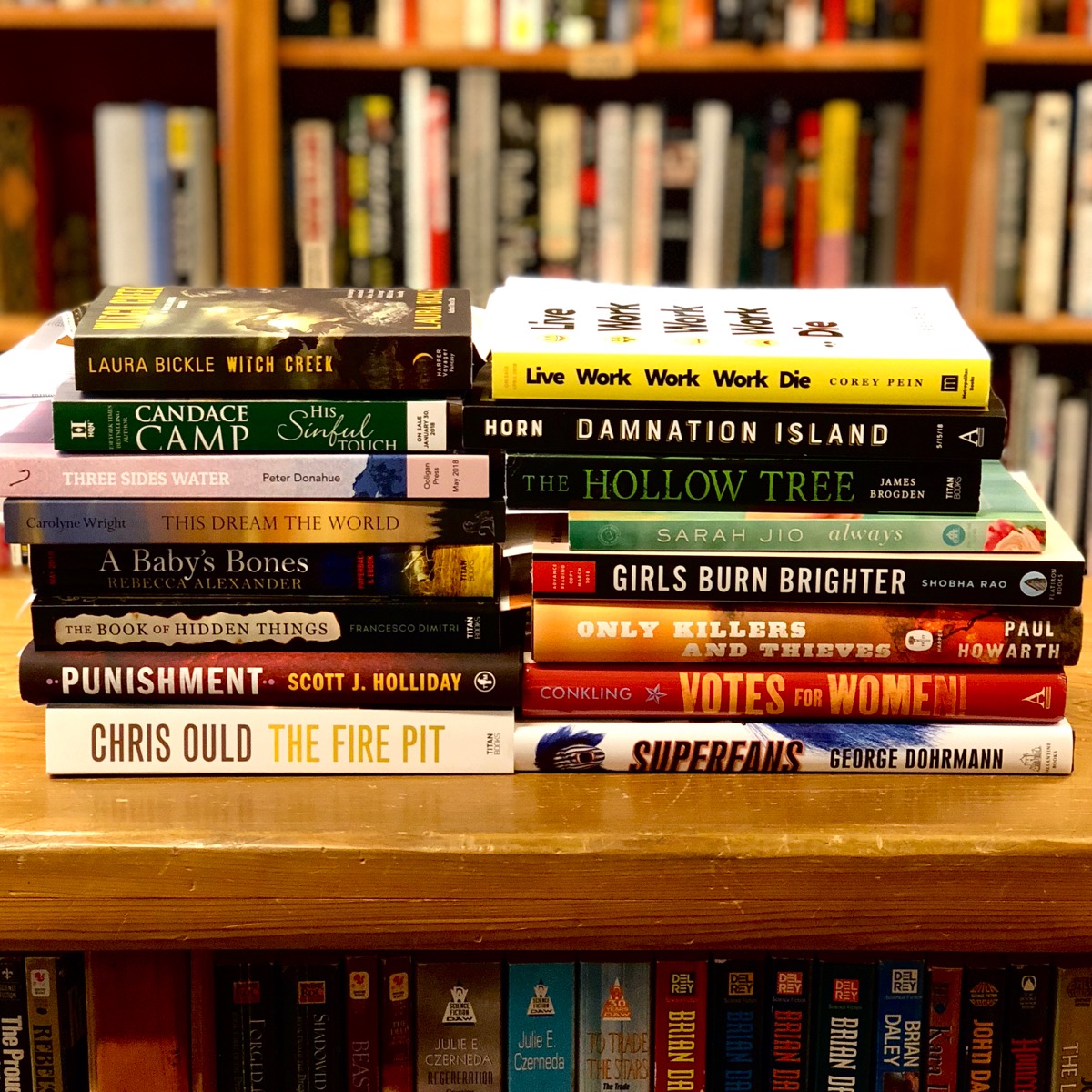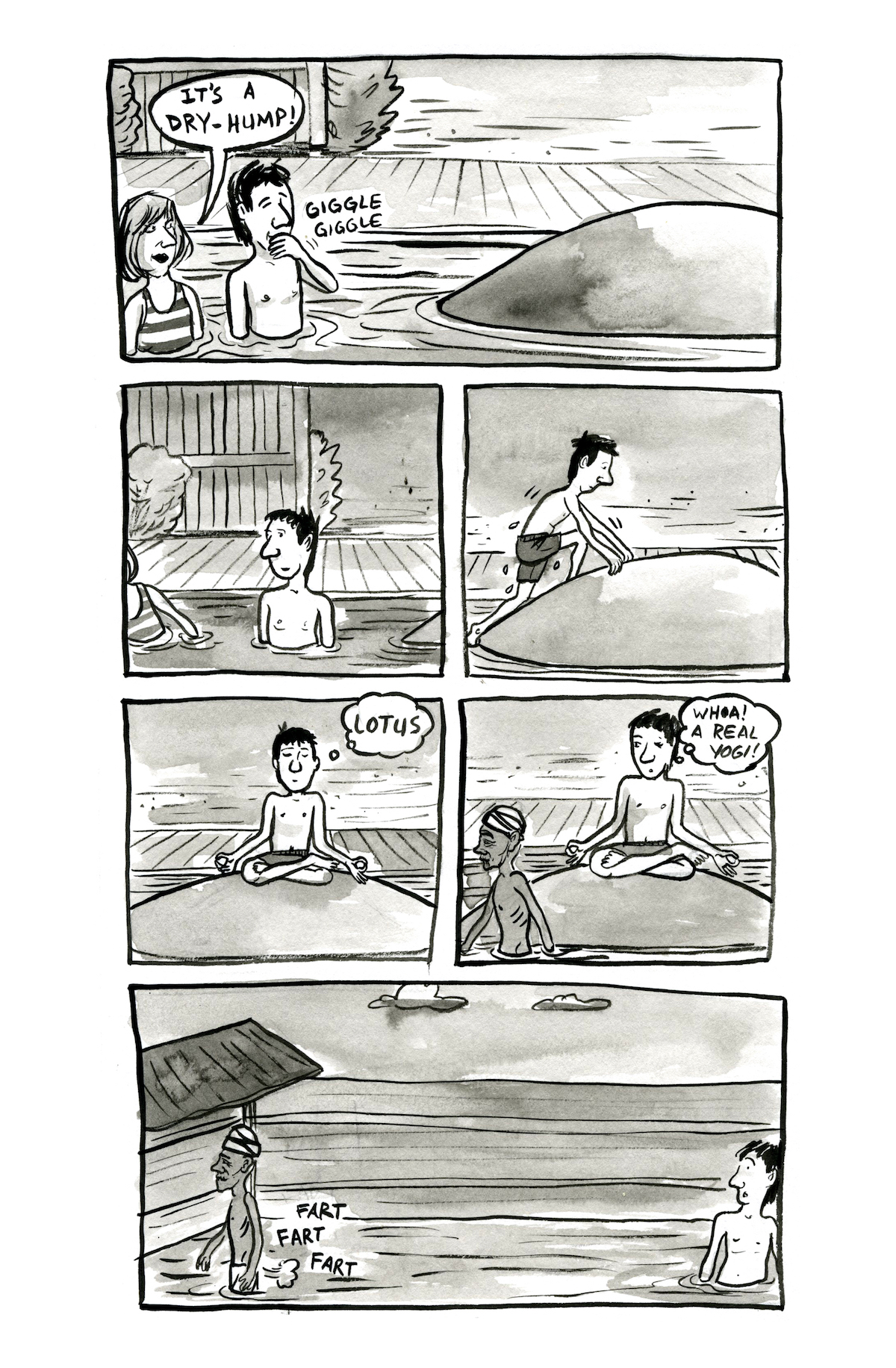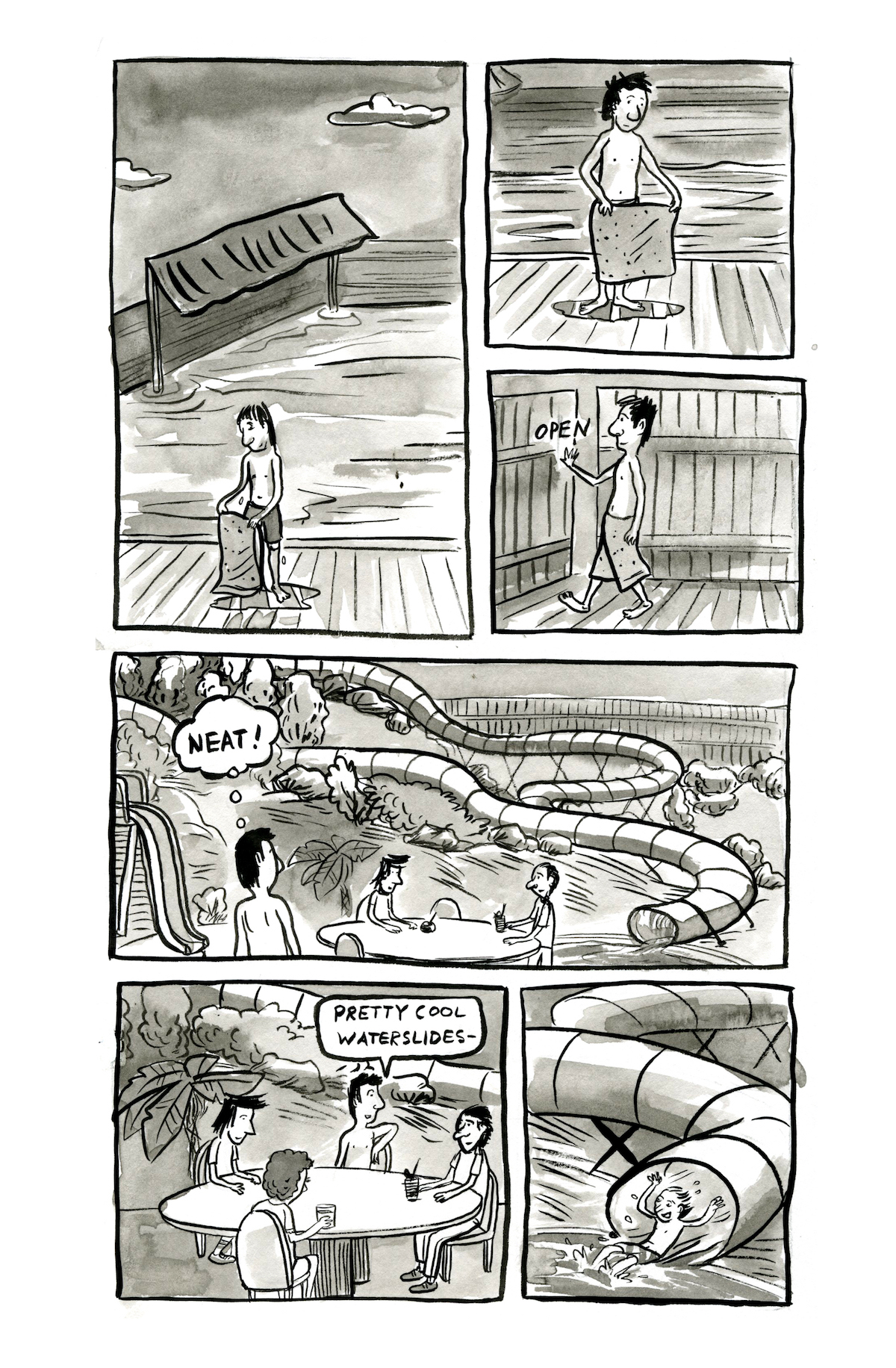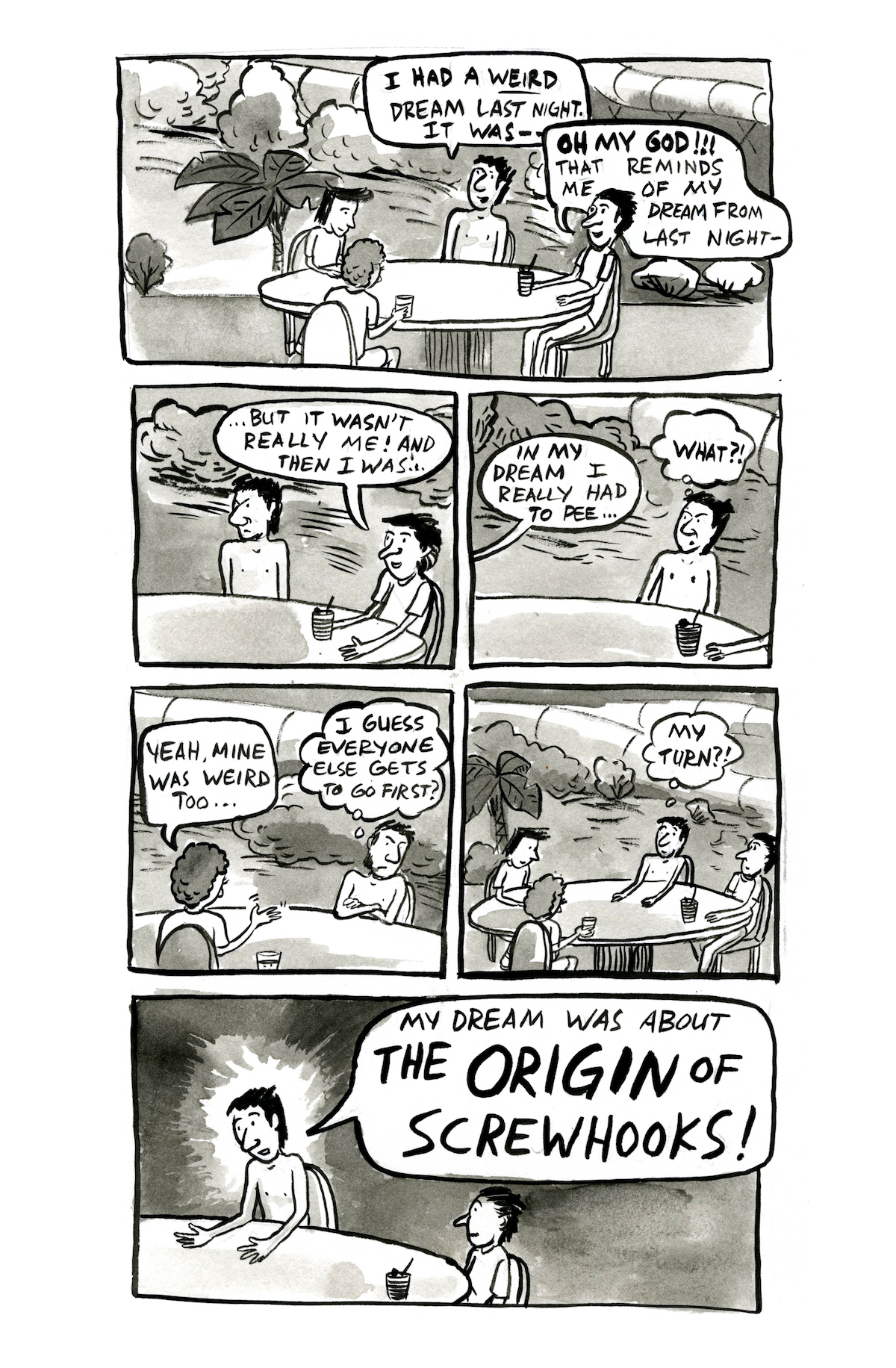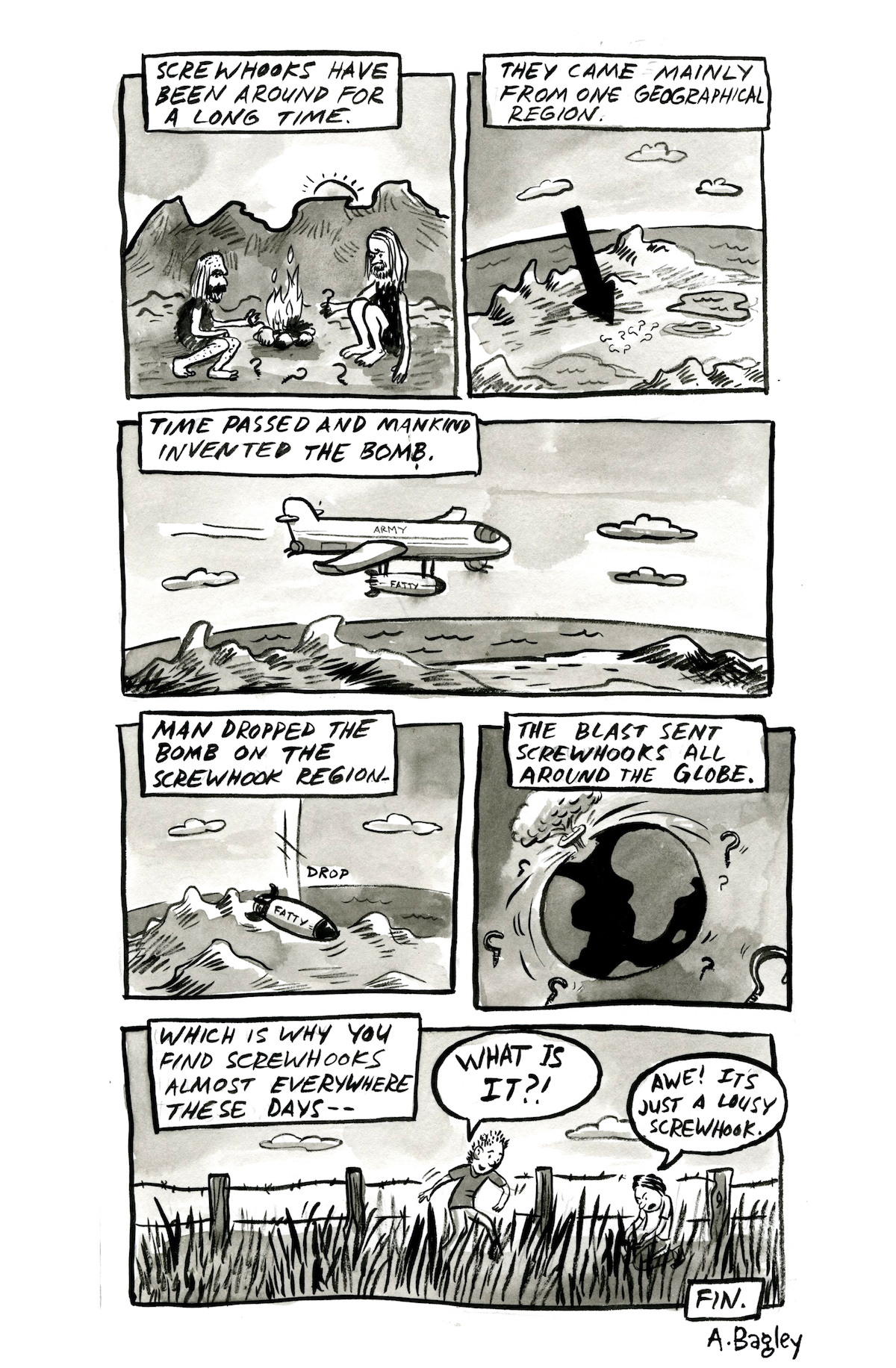I can't say I agree with all of Prateek Vasisht's assessments of the future of libraries, but there are some pretty good insights here:
The trend will be to move away from storing information, instead becoming a place for people for people to interact. Interaction can occur across various media such as with collection items (books, toys, games) or physical devices (pianos, electronics) and does not need to be restricted to human interaction.
Save the date: Vincent Comes Home launch party at Secret Garden Books on Sunday February 18th

Here's a SRoB conflict of interest that might be of interest to you: Seattle Review of Books columnist Aaron Bagley is debuting a new kid's book he created with his wife Jessixa Bagley in two weeks at the wondrous Secret Garden Bookshop in Ballard, and you're invited!
Vincent Comes Home is the story of a cat who lives on a freighter. When the freighter comes to port and its sailors all return to their homes, Vincent wonders if he has a home of his own. Aaron and Jessixa created the watercolor art for the book together and it's gorgeous.
The party is on Sunday, February 18th at 4 pm. Jessixa and Aaron will be there. And it's free!
It all works out, in theory
Published February 07, 2018, at 12:00pm
Literary theory: a mystery, or murder? Ivan Schneider dons deerstalker in pursuit of the truth.
Talking with Kevin Craft about finding substance and meaning in poetry when the world's gone mad
When our January Poet in Residence, Kevin Craft, left his post as editor of Poetry Northwest magazine in 2016 for an executive editor position, he tells me, “the first order of business was to take some time for myself and rediscover myself as a writer.”
Poetry Northwest has a long history of very fine direction from poets including Carolyn Kizer, Richard Hugo, and David Wagoner. Craft took his charge as editor seriously, guiding Poetry Northwest from some creative and financial doldrums back to its rightful place as the standard-bearer of the region’s literary traditions. But all that hard work meant he’d been neglecting his own writing. “I turned 50 last year,” Craft tells me, “and that’s a marker. I just needed to think a little bit, calmly, about what the next phase, the next half, of my writing life was going to be.”
The higher-level executive editorship allowed Craft the time and space to find his own voice again, even while he oversaw the creation of a new press of Poetry Northwest-branded collections — the first two of which will be published this year. Without the day-to-day work of assembling a magazine, he says he was able to get “back into a regular writing rhythm that wasn't interrupted by all the other things that [he] could or should be doing to push the magazine forward.”
Last year, Craft released his first book since finding his rhythm again, and at the time I said the collection, titled Vagrants & Accidentals, “feels like a book that’s been bottled up for a decade, just waiting to be introduced to an unsuspecting world.”
The release of Vagrants & Accidentals, with a reading world tour that included stops in New York City and Paris, felt like a significant moment in Craft’s evolution as an artist — a gateway between his earlier life and his present life. “I'm beginning to feel like the celebration of the release of that project is in the past,” he says, “and now it's time to move forward.” Wherever Craft’s poetry takes him, he’s well equipped with what he calls “a pretty good stockpile of poems.” “I think I have enough for another collection but I don't know yet what the shape of that collection is,” he tells me.
"When you hear shoddy language, abusive language, you want to push back with all your might."
Craft says the most important question he’s been dealing with as a writer is the “fused” connection between “personal prerogatives and public imperatives.” And poetry in the year 2018 exists in both of those spaces. “We live in a time,” he explains, “where speaking out is an act of sanity. I find myself saying to the radio every day, ‘No! That's a lie! Those are lies!’ And when you hear shoddy language, abusive language, you want to push back with all your might. I feel that as a teacher and I feel that as a writer. I feel it as a parent.”
Craft says that he’s always been interested in a poet’s role in public, but “I feel that end of things a little bit more keenly now, like many of us do.” He wants poems to be personal and honest and reflect everything that poems should — “the death of parents, travel, the state of world, beauty, natural wonder” — without feeling “miniscule or somehow beside the point” in a time of President Trump.
For Craft, the poems always start from deep inside. For him, writing begins as he’s “swimming in the sea of language and looking for that discovery — the thing that surprises me, that thing that I don't already know.” When he realizes he’s caught hold of something good, he feels a connection to “an opening in time that says you’re participating in something much bigger than you alone in this moment.”
In a quest to understand the current moment, Craft has spent a lot of time reading the roots of his poetic education. “I do keep up with people who are writing now,” he says. “But where I really go for comfort is backward, I'm afraid — Adrienne Rich and Elizabeth Bishop. Literature has our backs, really.”
“I think I've come to this understanding,” Craft says: “there is no utopian arrival. There is no permanent dystopia, for that matter, either. There is just a recombination of the same elements, and generation after generation has to pick up the struggle. I think that's what you see when you look backward in history: you see that we’re never going to get to some perfect place.” He says artists just have to learn to come to terms with that constant struggle “in ways that don't overwhelm us on a daily basis. And I think that's where poetry and art come in, really. Not in some fancy way but in a genuine way.”
Craft has been searching around for a way to explain what he’s getting at, and at the end of our conversation he’s finally found it. “You know, you’ve got to eat protein in order to have energy to get through the day,” he says. “I want the poetry of protein, not the poetry of carbohydrate.”
Book News Roundup: Opportunities including Fellowship Awards, a coworking space, and a book club
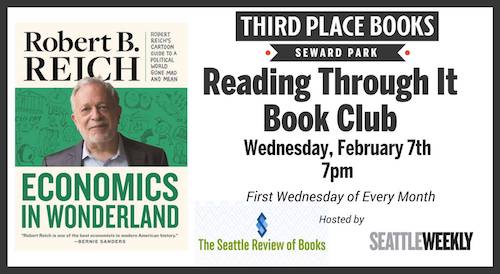
Don't forget to come to the Reading Through It Book Club tomorrow night at Third Place Books Seward Park as we discuss former Labor Secretary Robert Reich's new book Economics in Wonderland. The book, published by Seattle comics geniuses Fantagraphics, is a great primer on why income inequality is so horrible right now and what we can do to fix it. Here's the Facebook event listing. I hope you'll join us.
You can now apply for Artist Trust's Fellowship Awards, which give $7,500 to ten artists of any discipline. Applications close on March 5th, so don't procrastinate.
Type Set, which is a coworking space for writers in Seattle's south end, is trading a membership in exchange for a couple hours per week of social media and clerical volunteer work. Read more about it here.
There's now a GoFundMe set up to crowdfund late Seattle cartoonist Mark Campos's last book, Casino Son. Ten bucks gets you a copy of the book and helps Campos's family.
And in national book news, Oprah's next Book Club pick is An American Marriage, a novel by Tayari Jones. You can read an interview with Jones about what it's like to take the call from Oprah at Entertainment Weekly.
Also, House of Leaves author Mark Danielewski's latest project, which was anticipated to be a 27-volume series, has "been paused" due to lack of sales at volume 5.
The dark side of the sun
Published February 06, 2018, at 11:55am
Tonight, Seattle author Ross McMeekin reads from his brand-new noir thriller, The Hummingbirds. It's a book that seems aware of the genre conventions that came before it, while still falling prey to the occasional oft-repeated cliche.
Missing Persons Report Filed for the Knife of Charleena Lyles: June 18, 2017
police
glanced her tongue & saw blade
conjured gun
from the cockiness
of her throat dare breathe
saw vertebrae of her quaking spine
/ grenade keys
mistook her words
as / gunpowder
every
blink
a
/ trigger
she
pregnant ticking
/ bomb.seattle police call this nightmare-making
“Training Policy”(using a taser “wasn’t protocol”.
“hands on approach” would have
“put them at risk”
pepper spray was “tactically counterproductive”
could have endangered
the officer’s ability
to
breathe.)“There was no viable alternative,”
department says,
besides twisting her body — black & alive —
into a bansheea black woman’s body
is always gleaned more weapon
than mother
as if nothing
can harvest here but
husks of babies
& bullets.Charleena Lyle’s knife last seen:
cutting the ribbon on Inauguration Day of Seattle’s new mayor
whose glass-ceiling womanhood
— like her title “trailblazer” —
is also steeped in whiteness.Charleena’s knife last seen:
cutting the limestone of this
Glittering Republic
skyscraper
by
skyscraper
headstones in a city she might
have once called hers
but would never hug
her backCharleena’s knife last seen:
haunting the guilt of officers & a city too infatuated
with its own reflection
to see her
gleaming in the corners of
their Trumped-up nightmares.Seattle,
after all,
only has so much patience
for those who are black and angry
trauma longer than a soundbite
and a week of headlines“how awful they must feel,” someone pale & alive tells me,
“to have killed someone by mistake. To have to live with that.”police brutality ain’t supposed to happen here, right?
not in this safe space city
its liberals are so heartbroken.
too bad their bleeding hearts don’t feed justice, just-stain hands.
too bad their guilt never makes it to the courthouses, somehow.
“too bad” “too bad” too bad”Charleena’s knife last seen:
cutting umbilical cord of
uniformed men
babied by a society that will always
call their fist an open palm
who will never teach them how to pronounce
a c c o u n t a b i l i t y
in front of a mirror“maybe they feel guilty,
but she’s still dead,” I say.Missing Persons Report for the Words I Did Not Say:
I CAN’T MAKE IT
THROUGH AN ARTICLE ABOUT THE SHOOTING
WITHOUT CRYING
THE SOBS BEATING MY CHEST
FEEL LIKE GUNSHOTS
Last seen:
shattering every,
heart of glass
& blood too dark
to bring up at dinner.
GUESS WHAT?
YOU’RE REELING FROM THE KICKBACK OF A GUN
YOU DON’T EVEN KNOW YOU SHOT.Charleena Lyles is still dead.
Seattle thrives & she is still dead.
Mayor sharpens her reputation on her headstone at the MLK rally & she is still dead
Police try holding her knife
up to a mirror
it shrivels into ash
yet she is still dead.she is still dead.
she is still dead.
Meet our February Poet in Residence, Azura Tyabji
Our January Poet in Residence, Kevin Craft, is a writer who has a deep understanding of Seattle's literary tradition and has taken on an active role as a caretaker of that tradition. (You'll hear more from Craft in an interview on that exact subject tomorrow.) Our February Poet in Residence, Azura Tyabji, is one of the newest and most exciting poets in our Seattle tradition.
As Marcie Sillman wrote in the summer of last year, Tyabji, a Seattle native and a student at Nova High School, burst onto the scene thanks to some nurturing poetry teachers and the great local organization Youth Speaks Seattle. She's a prolific writer and spoken word performer, and she has already represented our city at the national Brave New Voices slam.
We'll be running poetry by Tyabji every Tuesday of this month, and we'll sit down for an interview with her in the next few weeks. We hope Seattle Review of Books readers will enjoy and share the work of this bold new voice in Seattle poetry.
The flimflam man is back

Sponsors like Pope Brock make the Seattle Review of Books possible. Did you know you could sponsor us, as well? If you have a book, event, or opportunity you’d like to get in front of our readers, reserve your dates now — June and July are the last dates available in our first blocks of the year!
Your Week in Readings: The best literary events from February 5th - 11th
Monday, February 5: Thrilling Tales
The downtown Seattle Public Library hosts a lunch-period storytime for adults two times a month. It’s a chance for grownups to leave the office, relax and hand over their attention to someone else for a while. Todays’ short story selection was written by San Diego sci-fi author Greg Bear. It’s titled "Blood Music,” and it’s one of his beset-known works. Seattle Public Library, 1000 4th Ave., 386-4636, http://spl.org, 12:05 pm, free.
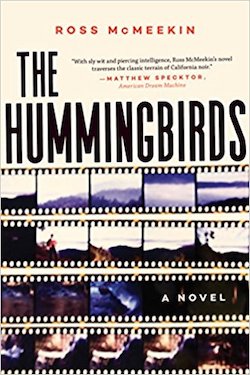
Tuesday, February 6: The Hummingbirds Launch Party
Seattle author Ross McMeekin was until this month best-known for editing the literary magazine Spartan. But tonight, McMeekin is launching his debut novel in a book party at the Sorrento Hotel. The Hummingbirds is about the hollow truths at the hearth of the glamorous lie that is Hollywood. Sorrento Hotel, 900 Madison St., 622-6400, http://hotelsorrento.com, 7 pm, free, 21+.Wednesday, February 7: Seattle Fiction Federation
The ongoing reading series hosts Seattle author Richard Chiem, who recently announced he’s got a novel on the way; novelist Jennifer Haupt, who has a debut novel coming out in a couple months; and short story author Andrea Eberly. Hugo House, 1021 Columbia St., 322-7030, http://hugohouse.org., 7 pm, free.Thursday, February 8: Baby Boomer
See our Event of the Week Column for more details. The Factory, 1216 10th Ave, 6 pm, free.
Also Thursday, February 8: It’s About Time Reading Series
Seattle’s longest-running reading series strikes again with readings from Annie Nguyen, Montreux Rotholtz, and Jenny Hayes. Tonight’s reading features a craft talk from Andrea Lewis. Ballard Library, 5614 22nd Ave NW, 684-4089, spl.org, 6 pm, free.Friday, February 9: Two poets
Open Books welcomes poets Natalie Graham and Brittany Perham, both of whom are launching new collections. Open Books, 2414 N. 45th St, 633-0811, http://openpoetrybooks.com, 7 pm, free.Saturday, February 10: I Wrote This Book Because I Love You Reading
Cartoonist Tim Kreider comes to town with a new book of essays about topics including “a trip with a close friend aboard a circus train bound for Mexico, a whirlwind affair with a sex worker, and the surreal experience of falling in love with a married friend in the weeks following the 9/11 terrorist attacks.” Elliott Bay Book Company, 1521 10th Ave, 624-6600, http://elliottbaybook.com, 7 pm, free.Sunday, February 11: This Is the Place Reading
This Is the Place is an anthology edited in part by local author Margot Kahn. It’s about women and motherhood and home. She’ll be joined by some contributors to the anthology. Montlake Library, 2401 24th Avenue E, 684-4720, spl.org, 2 pm, free.Literary Event of the Week: Baby Boomer at the Factory
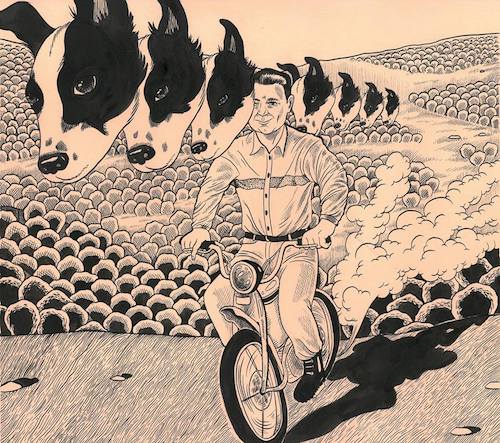
Marie Hausauer is one of Seattle’s mightiest cartoonists. Check out any of her strips and you’ll immediately recognize her confident lines and bold color choices. She can be funny or serious or flip back and forth between the two in a single eight-panel strip.
And Hausauer is transcending the gag strip in exciting ways. Her 2016 comic Raccoon focused on the dead and rotting body of a raccoon in the Northwest wilderness with a literary sensibility that evokes minimalists like Raymond Carver. At the time, I remarked that “Raccoon’s realism falls comfortably within the continuum of Northwest fiction. It feels like a story that could only spring from our part of the world.”
Hausauer also works in the field of visual art — by which I just mean she sometimes draws without words or panels. Last year, she brought a show called SLIDESHOW to art space The Factory. In it, she illustrated a family’s photo slides from the 1960s. On Thursday, February 8th, she returns with Baby Boomer, a new set of illustrated found slides featuring dirt bikes, families, and weird gender politics.
Make no mistake: Baby Boomer is a comic. It tells a story about the past, which also reflects on our present. The way Hausauer imagines the elements of these photographs comments on the past and remixes it for our uncertain present. One can imagine all these works collected in a book that documents the American Century as the American Century documented itself. I’d read the hell out of that book.
The Factory, 1216 10th Ave, 6 pm, free.
The Sunday Post for February 4, 2018
Each week, the Sunday Post highlights a few articles we enjoyed this week, good for consumption over a cup of coffee (or tea, if that's your pleasure). Settle in for a while; we saved you a seat. You can also look through the archives.
Hello, Goodbye
Jessica Mooney, talking about loss and inevitability, translates the small details of her experience into something lyrical, heartbreaking, and breathtaking.
I don’t know how to say what I mean. As a kid, I mixed up the words for things. Cat, I’d say, pointing at an alarm clock. Taxonomy remains mysterious. Walking around my neighborhood, I don’t know the names of things. Sinister witch-fingered bramble. Orange thing I want to call persimmon. The part of the foot that keeps me upright. The sinewy blue veins under the tongue. How do I not know the basic recipe for standing and speaking?
I love you. I wonder if I hear the words in the same place I hold my missing father. My brain’s translation: goodbye, goodbye, goodbye.
To Be, or Not to Be
Masha Gessen, a citizen of and outsider in both the United States and Russia, asks what choice (of home, of gender, of passion, of person — of who to be, and of what to say and do) means in a totalitarian regime. For example, the one into which we’re rapidly sliding …
Choice is a great burden. The call to invent one’s life, and to do it continuously, can sound unendurable. Totalitarian regimes aim to stamp out the possibility of choice, but what aspiring autocrats do is promise to relieve one of the need to choose. This is the promise of “Make America Great Again” — it conjures the allure of an imaginary past in which one was free not to choose.
The Unabashed Beauty of Jason Brown on Ice
Your eyes might try to glance past this piece on ice-skating from the New York Times Olympics special, especially with the Tonya Harding media resurrection blaring from screen and page. Don’t let them: Patricia Lockwood’s take on figure skater Jason Brown is sympathetic and fascinating, capturing what is loveable, changeable, and eternal(ish) about the sport.
“Does ‘Riverdance’ bang?” you ask yourself uneasily. “ ‘Riverdance’ might actually bang.” Suddenly, here come the goose bumps. The elasticity of his Russian splits belongs to ballet; his flexibility is less like rubber bands than ribbons. His spins are so beautiful that they look as if they might at any moment exit his body completely and go floating off like the flowers in “Fantasia.” And running alongside the joy is something grave, which seems to me to be respect for the gift.
Him Too? How Arthur Miller Smeared Marilyn Monroe and Invented the Myth of the Male Witch Hunt.
The accusation “witch hunt” is a favorite weapon for powerful men seeking to silence the #metoo movement. For another powerful, fearful man, says Maria Dahvana Headley, it was a way to silence — on the page, if not in life — a woman who asked for more consideration than he wanted to give.
Women, unless they are very devout and very old, The Crucible tells us, are unreliable and changeable. They’re jealous. They’re vengeful. They’re confused about sex and about love. They might, given very little provocation, ruin the life of a good man, and everything else in the world too.
Miller wrote it that way for a reason.
The cult of Mary Beard
Charlotte Higgins’s profile of Mary Beard is full of toothsome details and cursing. Here’s how one woman became a celebrity scholar more or less by not giving a single fuck.
Her career stands, in a way, as a corrective to the notion that life runs a smooth, logical path. “It’s a lesson to all of those guys – some of whom are my mates,” she said, remembering the colleagues who once whispered that she had squandered her talent. “I now think: ‘Up yours. Up yours, actually.’ Because people’s careers go in very different trajectories and at very different speeds. Some people get lapped after an early sprint.” She added softly, with a wicked grin: “I know who you are, boys.”
Whatcha Reading, Donna Miscolta?
Every week we ask an interesting figure what they're digging into. Have ideas who we should reach out to? Let it fly: info@seattlereviewofbooks.com. Want to read more? Check out the archives.
Donna Miscolta is a Seattle-based writer, most recently of the story collection Hola and Goodbye, and a frequent contributer to the Seattle Review of Books.
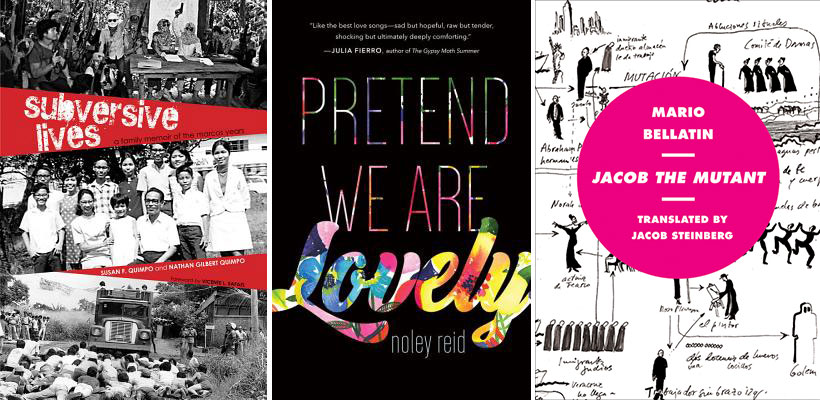
What are you reading now?
I’m reading Subversive Lives: A Family Memoir of the Marcos Years. Authorship is attributed to Susan F. Quimpo and Nathan Gilbert Quimpo who combined their separate accounts of life (and death) during the Marcos regime. However, the two siblings sent the merged manuscript to their other siblings who also ended up contributing to the text. They were ten siblings in all — bookish, physically slight teenagers or young adults who were involved in one way or another in the resistance, drastically changing their lives. Some were detained in camps, some eventually left the country, two were disappeared. Highly readable and thoroughly captivating.
What did you read last?
I read Pretend We Are Lovely, a novel by Noley Reid. It shows the unraveling of a family in the aftermath of unspeakable loss complicated by distorted relationships with food and unmet needs for emotional nourishment. The story is told from multiple points of view, often with quick cuts between characters that magnify their individual and shared crises. I read Reid’s story collection So There! a few years ago and loved the grace of her prose and how she brings us nose-to-nose with the flawed humanity of her characters.
What are you reading next?
Mayumi Tsutakawa gave me a copy of Jacob the Mutant by Mexican novelist Mario Bellatin, so I’m going to give it a try. Experimental fiction is a challenge for me. The book is a compact little thing, which makes it all the more scary. I fear the ambiguity, enigma, and cunning compressed in those pages that will slip right past my traditionalist mindset. But it has a fabulous cover, so I’m intrigued.
Hugo House hiring new events curator
Hugo House Event Curator Peter Mountford just dropped some big news down the Friday-afternoon news-hole:
I’ll be leaving my post as @HugoHouse’s events curator in a couple months, and we’re hiring a replacement (it’s a national search if you’re interested in moving to Seattle). It’s an awesome opportunity, and I love Hugo House, but I gotta write more https://t.co/T9upg6npkz
— Peter Mountford (@PeterMountford) February 2, 2018
Hopefully, we'll be able to do an interview soon with Mountford to discuss his tenure and what he's working on next. But for now, let's focus on the job opening: this is a very important role. If it's going to draw in audiences and serve as a community literary center, Hugo House has to represent a very fine balance of local and national authors. Their Literary Series combines big-name writers from all over the world with local talents, and their Craft Talk series featuring popular authors talking about writing (an upcoming one features Ruth Ozeki, for instance) draws the kind of huge crowds that help pay the bills.
Many years ago, back when the House was under different management, that balance tipped too far in the direction of national acts, and it left the House feeling aloof and disconnected from the scene. (Not to mention the fact that some of those national acts were very expensive and the House wound up in dire financial straits for a while.) It took years of good event planning to make the House feel interwoven with the community again.
So. Is this you? Do you think you can present a series of unique and exciting literary events that represent the hinge where Seattle meets the world? If so, apply now!
The Help Desk: Make room for a woman on that pedestal, buddy
Every Friday, Cienna Madrid offers solutions to life’s most vexing literary problems. Do you need a book recommendation to send your worst cousin on her birthday? Is it okay to read erotica on public transit? Cienna can help. Send your questions to advice@seattlereviewofbooks.com.
Dear Cienna,
I am bestowing upon you the power to remove any one man from the literary canon. At the same time, I’m granting you the power to add any woman to the literary canon. Whom do you choose?
Francine, Whittier Heights
Dear Francine,
I would remove: Tom Hanks. (Please just stop.)
And replace him with: Seattle writer Stacey Levine.
Calling a writer's prose "unexpected" is trite but Levine's prose is exact and strange and provokes thoughts in my head that I would be unable to produce on my own. She is underrated and I think it's a shame.
Tom Hanks will make a great Mr. Rogers but his short stories are a snooze fest – only by the grace of slavering sycophancy did one of them end up in the New Yorker. I'd rather tweeze hairs from strangers' chins for tips than read another Tom Hanks short story. I'd rather watch a rat gnaw the mole off my left breast. I'd rather listen to the late Mr. Rogers read 50 Shades Freed fanfic.
In fact, I think everyone who paid $75 to see him at Seattle's McCaw Hall (or anywhere else in the country) should now be forced to pay their favorite local literary nonprofit $75 to listen to Tom Hanks as Mr. Rogers read 50 Shades Freed fanfic – that would be a worthy crossover event that would tap Hanks's actual talents for a great cause. And it would likely make for a more interesting evening than watching Hanks read about young youths and old typewriters.
Kisses,
Cienna
Book News Roundup: Opportunities available for poets, cartoonists, sci-fi writers, and more
Paul Tumey at the Comics Journal wrote a lovely, detailed remembrance of Seattle cartoonist Mark Campos, who passed away in January. Campos was an incredibly supportive cartoonist, reader, and friend. I can't quite bring myself to accept that I won't bump into him at the next Short Run. He was devoted to cartooning, and to Seattle, and to all his many friends. I'll miss Mark very much, and Tumey's piece is a good and fitting tribute to his life.
If you're a woman who makes comics, you should definitely apply for Short Run's five-day Trailer Blaze residency. It sounds like a fantastic opportunity, and I've talked with several women who have loved the experience.
Residents will stay in their own full-sized, refurbished Airstream trailer or a spacious Lodge room. Both have a bedroom, bathroom, kitchen, and sitting room with desk or table. Residents are responsible for their own breakfast, lunch, and snacks, but each evening all residents will convene for a group dinner.
And if you make comics and you're interested in selling them, applications are now open for the Bellingham Comics Arts Festival, which will take place on the last day of March.
Clarion West, that amazing sci-fi writer's organization, has announced that Game of Thrones author George R. R. Martin has worked with them to create a new Worldbuilder Scholarship:
Each year, the WORLDBUILDER SCHOLARSHIP will cover tuition, fees, and lodging for one Clarion West student who demonstrates both financial need and a talent for worldbuilding and the creation of secondary universes. The scholarship will be conferred via blind judging, and will not be limited by age, race, sex, religion, skin color, place of origin, or field of study.
And if you're a poet, the Kundiman Poetry Prize is now accepting applications. As they explain on their site, "The Kundiman Poetry Prize is dedicated to publishing exceptional work by Asian American poets at any stage of their career. Winner receives $1,000 and book publication with Tupelo Press."
Brett Hamill wrote a fantastic profile of the second life of Capitol Hill used bookseller Horizon Books for Capitol Hill Seattle Blog:
Letsinger, with a small staff of employees, aims to position the shop as a community space, hosting events such as poetry readings, book clubs, art shows, and Dungeons & Dragons meetups. They’ve set up tables and afghan-swaddled chairs to encourage guests to linger in the cozy subterranean grotto.
- KING 5 posted a video tribute to Zanadu Comics, which closed last week after more than four decades in operation. Consider this your reminder to please support Golden Age Collectables in the Pike Place Market, which is the last comic book store left downtown and may be the oldest comic book store in America.
Portrait Gallery: Typewriter
Each week, Christine Marie Larsen creates a portrait of a new author for us. Have any favorites you’d love to see immortalized? Let us know
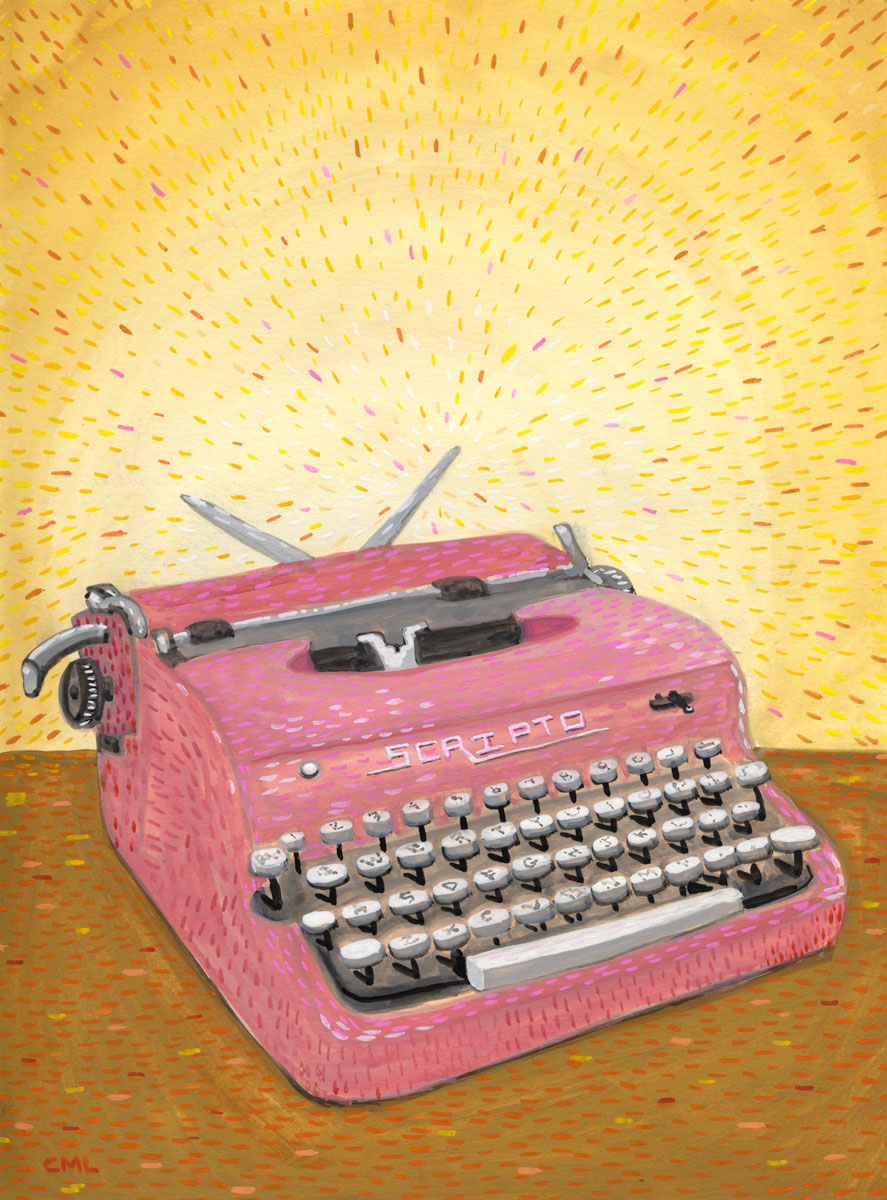
Get writing
Your story isn't going to write itself.
Kissing Books: taking it on the ego
Every month, Olivia Waite pulls back the covers, revealing the very best in new, and classic, romance. We're extending a hand to you. Won't you take it? And if you're still not sated, there's always the archives.
My favorite alpha heroes in romance are the fragile ones.
They don’t seem fragile, at first. Consider Alec Kincaid from the RITA-award winning classic romance The Bride. He’s a big, burly Scotsman, the much-feared laird of his clan, who kills enemies easily and without a second thought. He’s manipulative and self-centered and emotionally closed-off after the mysterious death of his first wife. He is the most important man in his world, and he’s not afraid to throw his weight around and give orders to absolutely anyone short of his king.
In short, he is a giant ego-balloon, and the bigger he swells the more fun it is to buckle in and wait for the inevitable pin to find him.
Because of course Alec’s self-inflation has to be punctured. Anyone who’s read more than, say, three romances can see it coming from chapter two. He’s going to be matched with a tiny, too-pretty, naively optimistic virgin with violet eyes named Jaime, and this insignificant non-entity — with no physical strength, legal power, or wish to do harm — is going to turn him entirely inside out. She’s going to disobey him, undermine his authority, and fearlessly demand what she needs. She’s going to convince him she’s right to want to help people, to be kind, to trust others. She’s going to make him question everything about himself, and — here’s the kicker — this big, tough, weathered warrior is going to be grateful for all the changes. Because a romance hero may be strong at the start of the book — but it’s the events and transformations of the plot that turn him into a hero.
As much as we talk about alpha males in romance, ego-balloons are not only carried by musclebound alpha heroes. Elizabeth Bennet in Pride and Prejudice famously has her own self-regard deflated a bit before the happy ending. Shelly Laurenston’s shifter heroines tend to be as sexually frank, egotistic, and casually violent as the heroes. (That’s a compliment, by the way: those books are fun.) And there’s a whole strain of romantic comedies where the hapless city girl in too-high heels has to learn humility from a hard-working country boy in work boots. General patriarchal pressures often apply: there are too many toxically masculine heroes who aren’t de-bro-ified enough, and far too many haughty (or simply human) heroines whose abject embarrassment we’re supposed to wallow in. The lines are all highly subjective: one reader’s too far is another’s not far enough for what they did/said.
I started thinking about egos and punctures while reading Alyssa Cole’s upcoming A Princess in Theory (reviewed below). Our hero Thabiso is a handsome, educated, wealthy prince from the South African nation of Thesolo; he’s been raised with all privileges and the weight of decision on his broad, young shoulders. It has not, shall we say, left him struggling with the burden of self-doubt. Heroine Ledi has mistaken him for the new waiter she was supposed to train, and to get close to her, Thabiso plays along: “He was feeling rather pleased with himself. Not only was he an excellent negotiator and a shrewd businessman, but having completed the tasks assigned him, he was well on his way to becoming a master waiter, too.”
This is the ball being tossed in the air.
And then the racket comes around and whack: ten minutes later, our master waiter is dumping fish into the lap of a VIP, setting fire to the fondue station, and getting unceremoniously fired by our heroine.
It’s all about the expectations. Romances live and die on the alchemical reaction of reader expectations combining and combusting with the reality of the text. We expect a happy ending — but what has to happen first? We expect a hero to be, well, heroic — but what if instead he is, as the old Princess Bride blurb goes, a son of a bitch? Of course there are plenty of alpha heroes whose alpha-ness isn’t challenged because it’s the foundation of the fantasy (dukes, billionaires, vampire Viking angels), and while I understand the escape those books offer I find myself much more gratified by books where the alpha’s overweening ego is the set-up to an eventual well-earned punchline. It’s more dynamic, for one thing; it’s what Nisi Shawl points to when she talks about narrative tension: “the gap between ‘what is’ and ‘what must be.’” What is: the hero’s self-image. What must be: his transformation.
The ultimate result is something that has long been deeply uncool to talk about with respect to literature: a moral. When overbearing alphas change their tune, when egos get bruised and recover, there’s always a moral lesson in it. Sometimes it’s as simple as: Love matters. Sometimes it’s dark and complex and nuanced with, ha, over twoscore shades of grey. But very nearly all romance has some element to the plot that’s trying to tell you how to be a better person: sexually, emotionally, or among the people in your community. It’s why it’s not terribly far-fetched for Jennifer Weiner to argue in the New York Times that romance novels fill in a lot of gaps left by sex ed curricula that are either abstinence-centric, queerphobic, or both, or that limit the conversation around sexuality to mere biological terms while ignoring issues of consent, desire, and self-expression. There is a lot about sex that is more about words and thoughts than it is about body parts, and romance is the literature we’ve developed to grapple with that.
This month the egos are out in full force and they’re all — well, mostly all — cruising for a bruising. We have a self-involved vampire who is quite literally heartless; a brash dance student-turned-professional choreographer who has no problem telling his former dance teacher exactly what she can do with his now-grown self; the charmingly self-important African prince mentioned above; a frontier mail-order bride who’s frighteningly handy with a rifle; and a mercenary warrior heroine whose stubborn pride is mighty enough to change the destiny of her world.
Recent Romances:
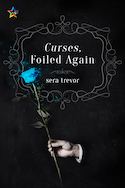
Curses, Foiled Again by Sera Trevor (Ninestar Press: paranormal m/m):
Trends or no trends, a good vampire novel is never out of style. This offbeat gem is less Interview with the Vampire and more What We Do in the Shadows, with that blend of the comic and the horrific that’s so hard to get right and so delicious when done well. Felix is a vampire living in LA whose preternatural strength and thirst for human blood are balanced out by his wistfulness, impulsive sincerity, and the inescapable fact that he’s dumb as a bag of hammers (a side effect of the vampire condition). Watching him occasionally try to be cunning is adorable: think a Goth Jason Mendoza from The Good Place. He becomes annoyingly fixated on a witch named John, who is living under a truly frightening, isolating curse, and in the way of all romance they slowly annoy one another more and more intimately. There are some truly horrific moments in the course of the plot — as well as actual consideration of the predatory nature of vampiric feeding, which is not the lightest of reading — so best keep this book for a moment when you’re in the mood to shiver a little. But if you’re a horror romance fan (I see you! I know it’s hard to find your catnip!) then you’re going to want to give this one a try.
He paused for a minute, trying to put together all of the feelings inside of him, so many of them buried. He felt like an archaeologist, uncovering his own soul piece by piece.”
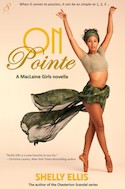
On Pointe by Shelly Ellis (self-published: contemporary m/f):
One way to quickly establish a heroine’s character is to show us who she is not. Here we meet Bina, a dance teacher at a DC studio, meeting her ex for coffee for the first time since she walked in and caught him cheating. She’s been lonely since the breakup, and she’s worried she won’t be able to resist him if he begs her to take him back. But that’s not why Carl wanted to talk. No, Carl has started his own architectural firm — in a partnership with the woman he was cheating with — and they have a big client who wants to buy Bina’s dance studio, tear it down, and built fancy-ass condos in the rapidly gentrifying neighborhood. And when Bina raises her voice in outrage at the callousness of this, Carl tells her not to be such an angry black woman.
What does our heroine do then? Bina dumps a full iced macchiato over his head and walks away, as coffee drips into the fine wool of her ex’s expensive suit.
Reader, by this point I was completely on her side.
And this was before we see how kind she is to her dance students, how much she loves her difficult mother, how hard she works to keep the studio from sliding into collapse. Meanwhile her former student, Maurice (Mo), now grown and hot as hell, has been hired to teach a hip-hop class in hopes of bringing in a new crop of students. Sparks fly, desires are denied, risks are taken, and romance blossoms. This is the set-up book for a three-novella series, so it ends with a bit of a cliffhanger and a Happy For Now rather than Ever After, but it’s written with such rare verve and energy that I’d have been hungry for more at any length.
We have to wait until April for book two — it’s gonna be a long eight weeks.
He eased through the doorway and his chest brushed her shoulder. It was like plucking a tuning fork. He could still feel the residual vibrations of their touch even as he stood in the center of the empty room and looked at the mirrored walls and white ceilings.
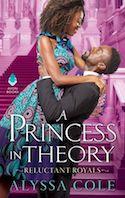
A Princess in Theory by Alyssa Cole (Avon Books: contemporary m/f):
Unlike vampire novels, Cinderella stories never, ever go out of style in romance, and this one is an absolute treasure of a Cinderella tale. We’ve covered our princely hero Thabiso above, so let’s talk about the heroine, Naledi Smith née Ajoua. She’s studying to be an epidemiologist and is super-geeky and smart, so when she starts receiving emails announcing she’s the long-lost princess of Thesolo and they just need to confirm her personal details to proceed, she hits the delete key quicker than a lab rat gunning for a sugar hit. She’s not only cagey about probable scams, either: a former foster kid who got bounced from family to family after her parents’ death, Ledi works hard to keep everyone at arm’s length because she doesn’t believe she’s the kind of person people can love in the long term. She is wary, witty, profoundly moral, and prone to silent, heartfelt cursing when beset by fools and fuckboys.
I absolutely adored her. I love when historical authors write contemporaries, because the world-building muscles honed in historical romance really shine when applied to modern settings. For instance, Ledi tends to look at the world through science metaphors: viruses, lab experiments, evolution, bacilli, bacteria. (One of my notes from later in the book: “Gonorrhea! So romantic!” Not sarcastic. It’s a truly touching moment referencing STIs. Romance Author Achievement Unlocked!) We’re also treated to a realistically diverse and lively New York with Latinx neighbors, Pan-African nonprofits, polyglot citizens, and subway dance performances. Plus a bit of a mystery subplot about a new disease cropping up in Thesolo’s mountain villages. I read until I could not keep my eyes open, slept a bit, woke up at four a.m., decided that was enough sleep to get by on, and finished the last ten chapters as the sun came up.
Then I read the teaser for book two, because it was right there and I still wanted more. And have you seen that cover? Romancelandia is due for a serious epidemic of dress envy as this series continues.

Tempest by Beverly Jenkins (Avon Books: m/f historical):
In Devil’s Cub by Georgette Heyer, straitlaced accidental abductee Mary Challoner shoots the Marquis of Vidal when he menaces her aboard his yacht. In Loretta Chase’s Lord of Scoundrels, seduced bluestocking Jessica Trent shoots the Marquess of Dain when he refuses to marry her to save her reputation. And now in Tempest Beverly Jenkins, First of Her Name, Slayer of Words, has given us Regan Carmichael, who shoots down three outlaws as they try to hijack her stagecoach — or rather, two outlaws and one doctor, who turns out to be the man she’s traveled across the country to wed.
Our heroine apologizes promptly to the doctor. She wastes no time worrying about the outlaws.
Regan is that rarest of creatures: a power fantasy heroine. She can shoot, drive a mail coach, and muck out animal stalls. She can bake, and cook, and help a shy, traumatized stepdaughter heal from a legacy of grief and abuse. She’s independently wealthy enough to stand up to all the petty-minded penny-pinchers in town who try and look down on her for being unconventional — and she has a sapphire satin dress with matching corset and garters that will blow a bridegroom’s hat clean off his head. She’ll know just what to do with that bridegroom when she gets him in bed, too, and she’ll never apologize for having loved someone before meeting the hero.
Does she sound too perfect? Implausible, or invulnerable? It doesn’t read that way. It reads like liberation — like you have a champion there on the page, a vision of strength and hope and heart who cannot help but fight to make the world a better place. When the grieving widowed doctor, who vowed never to forget his first wife, takes about three days to realize he’s halfway to falling in love with his new bride, the reader can only smile in sympathy and say: yeah, buddy, same.
“So you’ll accept my needs in the marriage bed without complaint?”
“As long as you extend me the same courtesy.”
”Good women don’t have needs.”
She scoffed, “And you call yourself a doctor.”
This Month’s High Fantasy Warrior Heroine, Plus The Dragons of Dubious Consent
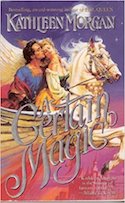
A Certain Magic by Kathleen Morgan
There will always be a part of me that wants a psychic dragon or magical horse I can ride around on while it tells me how brave and special and loved I am. I picked up A Certain Magic because the front cover promised winged horses and the back cover promised dragons. It has been a long bummer of a winter and I thought something fuschia-tinted would be just the thing.
We did indeed get dragons — an adorable, clumsy, loveable baby psychic dragon named Padborn and a big, sinister bastard named Dragon Father — but instead of winged horses, there was a lot of weird sorcerer sexual politics. Readers looking for something at the precise midpoint between Anne McCaffrey and Laura Kinsale will thrive on the whackadoodle nature of the story; readers looking either for gritty realistic fantasy or for consistent magical systems are straight out of luck.
While this book certainly had its rough edges (’twas rampant with Ye Olde Faux Medieval Dialogue), the real meaty mindfuckery is in the what gender and magic mix. Let me sum up as succinctly as I can:
Sorcerers are men who can augment their powers by having sex with women, consensually or otherwise. This can kill the woman. Galienes are women who are magically bonded to dragons. They also unlock their powers through sex (presumably with men, though this is never explicitly stated) and this sex hurts absolutely nobody. Hero Galen is a sorcerer who has sworn off sex after killing the woman he loved (pro tip: don’t take your evil twin’s word that this is actually what happened). Heroine Alena is a mercenary who tracks Galen down to get him to help defeat his twin, who’s been draining local women one by one. Alena is also a galiene, though she doesn’t know it, and she unwittingly bonds with baby dragon Padborn. Again, who would turn down a psychic baby dragon? But this bonding doesn’t unlock her full powers — so Padborn and Dragon Father work together to magically compel Alena and Galen to have Really Good And Surprisingly Graphic Magical Sex. While the dragons watch. Ayla and Jondalar vibes, anyone? Now Galen has his powers back but refuses to use them, and Alena has a bunch of mysterious new magic she can’t actually use herself. They argue a lot about the proper uses of force in self-defense and to stop evil, which is by far the most interesting part of the book.
The weirdest thing about all this sex magic is how not-tawdry it feels. I mean, yeah, dragon voyeurism and enforced desire and gender essentialism and all that baggage — but there’s a New Age-y kind of rudimentary sex-positivity in here that’s quaintly appealing. Alena is not a virigin and it’s not a thing: nobody even brings it up. Masturbation is a perfectly natural urge. Jealousy is toxic, sexual manipulation frowned upon (even the dragons get scolded for this), and rape is objectively evil and will turn the land into a grim, corrupt wilderness (which could explain Westeros — hey-oh!). Love and physical love are not precisely the same thing, but they are connected, and both are not only forces for good but things that actually save the world at the novel’s end. Galen, a pacifist who only barely learns to swing a sword in self-defense, takes over his brother’s castle and begins healing the land’s political and emotional damage, while Alena keeps her dragon, rebuilds the castle’s defenses, trains her own personal army, and explicitly says the only thing she’s keeping from the list of Proper Wife Traits is banging her husband like a drum. My teenage self would have adored this book; my grown-up self can see all the flaws, but feels a little wistful at the incredible story that almost, maybe, could have been if the author had done just a few things differently.
